This article was first published in Ahramonline on 15 February 2014
When he plays, the Arab world listens, even 53 years after his death.
Zakaria Ahmed, known as the “Sheikh of Composers," passed away on 15 February 1961.
Ahmed, was considered to be a pioneer of oriental music, which started flourishing in the early twentieth century. He composed 1,070 melodies, 56 operettas and 191 soundtracks to Egyptian films.
As an Azhar student, he learnt the seven reading methods of the Quran, as well as inshad (religious hymns) and Sufi chants. He was taken by the grace of religious chanting, which became his passion thereafter. For almost 18 years he focused on inshad, and composed some 32 tawashih (religious songs of praise) It wasn’t until 1923 that he composed his first non-religious taqtouqa (short catchy ditties) entitled Erkhi El-Setar Elli Fi Rehna (Put the Drapes Down).
He was the one who discovered legendary Egyptian singer Um Kalthoum, and together with poet Beiram Al-Tounsi, they created what the press referred to at the time as “the golden triangle.” Forty days after the death of his best friend Al-Tounsi, Ahmed himself passed away.
To commemorate the musical icon, Ahram Online looks over some news clippings from his death.
Excerpts from an article in Al-Ahram daily, written by Kamal El-Mallakh on 16 February 1961:
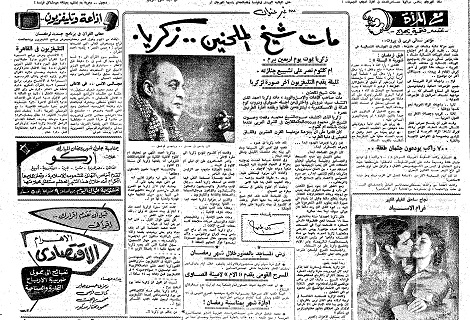
##
Headline and subheadings: Zakaria, the Sheikh of Music composers has died.
Zakaria Ahmed dies forty days after Beiram Al-Tounsi.
Um Kalthoum insists that she head his funeral.
Tonight, the television broadcasts Zakaria's last performance.
He never stood still, always with a smiling face, he who spent his life strolling in Darb Al-Gamamiz, (Islamic Cairo) amid his lifelong friends, listening to Sayed Darwish's tunes mixed with memories and endless chats on Beiram Al-Tounsy, Ahmed Ramy and Badi Khairy.
At the age of 16 he composed his first taqouqa, titled Erkhi El-Setar Elli Fi Rehna (Put the Drapes Down) (1923) which was criticised for being sensual. yet it marked his first success.
To Ahmed, “the modern song was like a rose with no scent.” He believed that Badie Khairy and Beiram Al-Tounsi are the best poets and lyrics writers. Zakaria Ahmed composed 56 operas, the first of which was Dawlet Al-Haz, (Fortune State) and the last was Aziza wa Younis. He also composed 1,070 songs, 45 out of which were sung by Um Kalthoum.
A few days before he died, Ahmed had already made Um Kalthoum memorise a new song written by Mamoun Al-Shenawy, titled :Aheb Tani Leih, Wa Aol LiQalbi Eih, Howa Elli Habak, Yeheb Tani? (Why Should I Fall In Love Again? What Should I Tell Your Love? How Can Anyone Who Love You, Love Again?). He also had prepared his opera The Gioconda, by Badia Khairy, to be played and sung by iconic singer Monira Al-Mahdeya.
I spent a nice evening at a common friend’s house with Ahmed. He sang all night long, as he never sang before, especially his favorite song Ya Salat El-Zein. He died three days later at the age of 64.
Excerpts from Sabry Abou El-Magd’s series on Zakaria Ahmed in Al-Mosawer Magazine 1961. The series was based on Zakaria Ahmed’s handwritten diaries.
On his bedroom wall, next to the Hijra calendar and drawings of [folk heros] Al-Zanati Khalif and Abu Zeid Al-Helali he’d hung a quote from Confucius that reads “I do not care who creates people’s laws, so long I create their music,” and such was Ahmed’s motto in life.
Ahmed started off his music composing career as part of the inshad (religious chants) troupe of Sheikh Ali Mahmoud and Sheikh Ismail Sukar. It was through them that he learnt and composed his first tunes. Attempting to pass on his blessings, he decided to help “small cogs develop into motors” and pledged to support any talent he found.
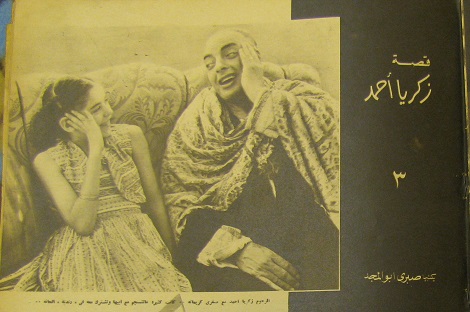
##
In Alexandria he’d heard of an amazing talented young sheikh who sings and composes his own songs. When he listened to him, he was enchanted by the authentic tunes and melodies. A few hours later, he’d book two train tickets to Cairo, for him and Sheikh Sayed Darwish, or what the Arab world would refer to as “the people’s artist.” In Cairo, Darwish’s talent was much more exposed and appreciated, and it is where he created his musical gems.
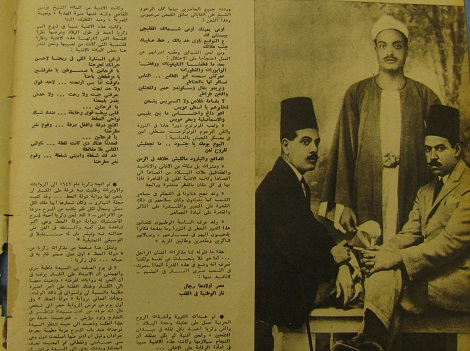
##
“In 1919,” Ahmed remembers, ”during Ramadan while reciting the Quran and religious songs, in Al-Senbelaween, I was intrigued by the young girl who kept attending all the nights I recite in and listened with admiration. I learnt she was Um Kalthoum, a young Quran reciter and munshida (religious singer), who came along with her father and brother daily from her small village Tamai Al-Zahayra just to listen to me.
"Later we went over to her place, and she cooked us goose, we played cards, then in return for her generosity, I composed her a nice song. After Ramadan, when I was asked to sing in a charity party, I asked Um Kalthoum to join, and that was her first time to sing and to come to Cairo."
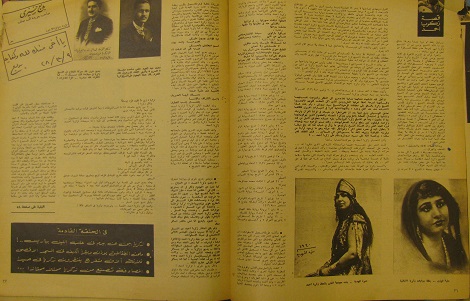
##
Excerpts from an article by Saleh Gawdat in Al-Mosawar magazine 1961
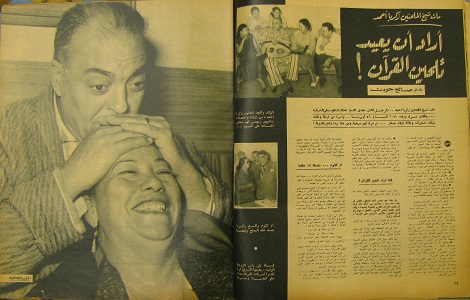
##
Aiming to preserve and document all Arabic maqamat, (Arabic music scales) Ahmed wanted to document different types of Quranic chants, with all maqamat, without any musical instruments, so that the legacy of Arabic music would be forever preserved. Unfortunately, his request was denied by Al-Azhar. (And a lot of maqamat from his days had already perished).
--
Below is a link to Zakaria Ahmed’s famous Song Ya Salat El-Zein
يا صلاة الزين - تسجيل خارجي.mp3
Courtesy of Esmat Al Nemr, co-founder of Misrfone.
Misrfone is dedicating a whole playlist to Zakaria Ahmed’s musical gems on Saturday 15 February. To tune in go to:
https://www.facebook.com/misrfone?ref=profile
Short link: